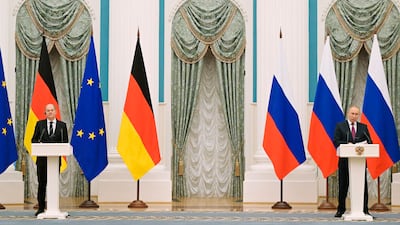Germany has denied that Chancellor Olaf Scholz uses language normally reserved for friends in his phone calls with Russian President Vladimir Putin.
Mr Scholz used the informal “you” in German when telling a crowd about his message to Mr Putin.
“End this war, withdraw your troops and clear the way for peace talks, which cannot be a peace dictated by Russia to Ukraine,” Mr Scholz said as if addressing the Russian leader.
The wording he chose would typically be used among children, young people and informally by adults.
Mr Scholz generally uses the more polite form of “you” when addressing foreign leaders, including allies such as US President Joe Biden.
His spokesman Steffen Hebestreit said Mr Scholz was talking rhetorically in his speech to party members.
“The chancellor does not use the informal ‘you’ with the Russian president, but the formal one,” Mr Hebestreit said.
“I believe he was using a rhetorical figure to talk about the subject and send his message.”

He said there was no significance in Mr Scholz appearing to refer more often in speeches to “Putin” rather than “the Russian president”.
A similar debate arose in France over President Emmanuel Macron's use of the French informal “you” in his calls with Mr Putin.
A French documentary that aired in June revealed that Mr Macron used the friendly “tu” while discussing Ukraine with the Russian leader.
He was criticised by rival presidential candidate Yannick Jadot, who said the two leaders should not “be mates”.
Mr Scholz and Mr Macron made high-stakes visits to Moscow in the weeks before war broke out, sitting far apart from Mr Putin over his long Kremlin table.
Since the invasion, they have both held numerous phone calls with Mr Putin, urging him to withdraw his troops and improve the humanitarian situation in Ukraine.
However, Germany's influential Munich Security Conference announced on Monday that it would not invite Russian officials to its next annual meeting in February.
"We will not give them a platform for their propaganda," said Christoph Heusgen, the conference chairman and an adviser to former chancellor Angela Merkel.


